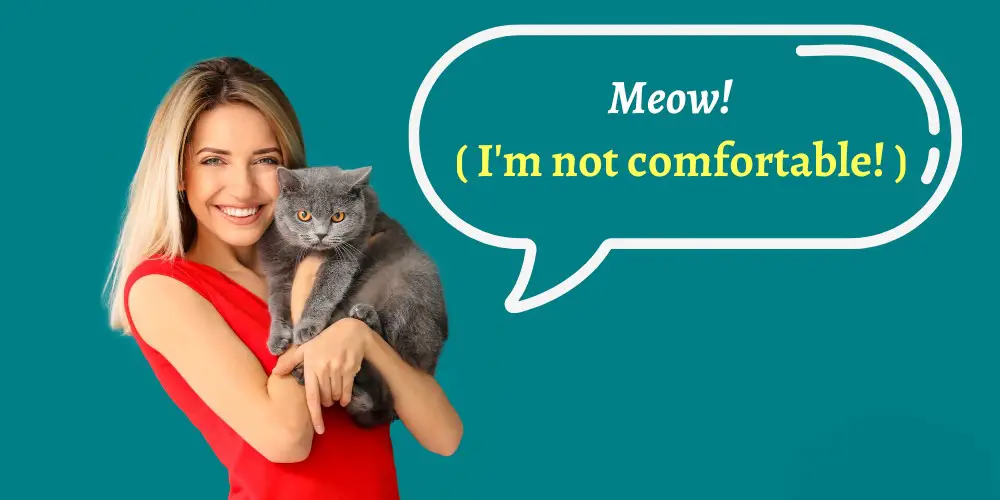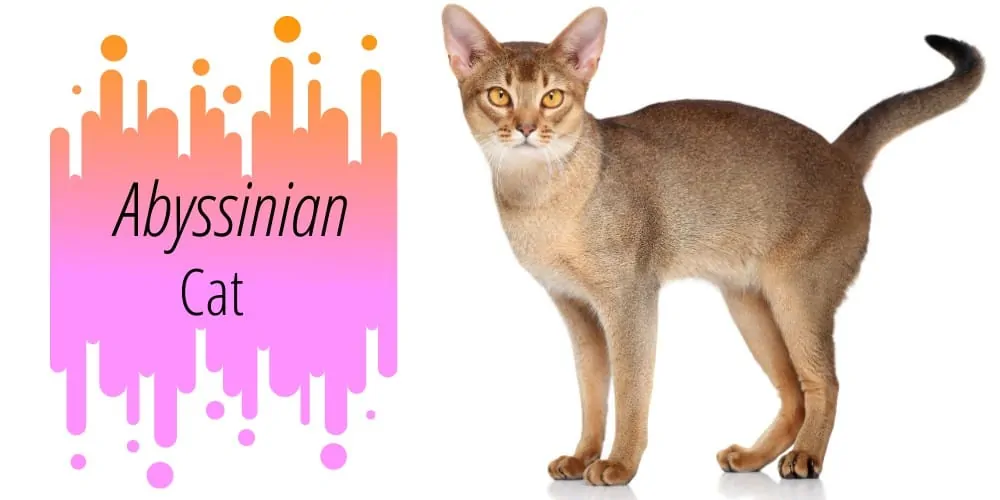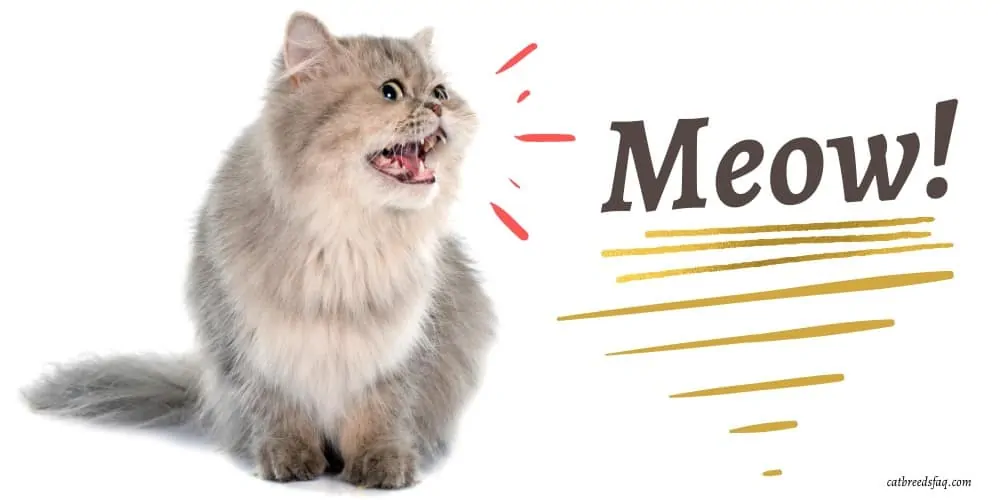Some cats demand attention; others can’t seem to leave us alone. But why do British Shorthair Cats hate being picked up?
What is it about being handled that rubs them the wrong way? It isn’t easy to imagine such a cute and cuddly cat would refuse to be treated as one.
British Shorthair Cats get uncomfortable when you pick them up – regardless of how careful you are about it. They are affectionate in ways that differ from other breeds. To them, it’s harassment rather than an act of affection.
Think about the different cultures of people out there, for example. In some cultures, a burp is equivalent to a compliment toward the host or chef.
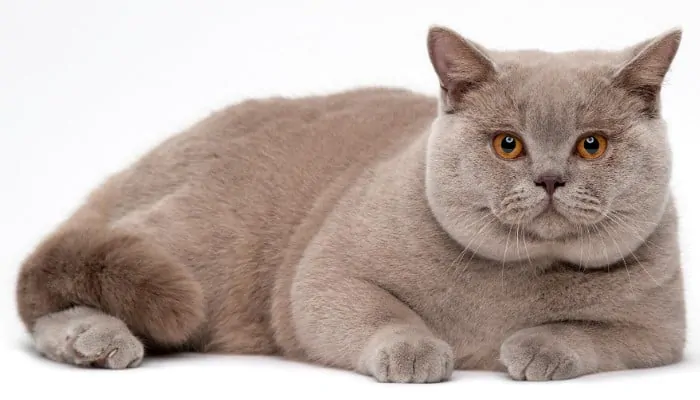
In other countries, the same behavior is deemed rude or even offensive. With cats, what’s acceptable with some breeds is not taken the same way by other breeds.
Some people mistake this behavior as unaffectionate regarding the British Shorthair. As far as they’re concerned- it is!
Our intentions and the different things we assume are well received across the board aren’t with particular breeds.
Rather than assuming that the British Shorthair is unaffectionate, look at it as picking it up could be the equivalent of pulling its tail from the cat’s point of view .
If you look at it that way, how affectionate are you truly?
What is the British Shorthair Personality?
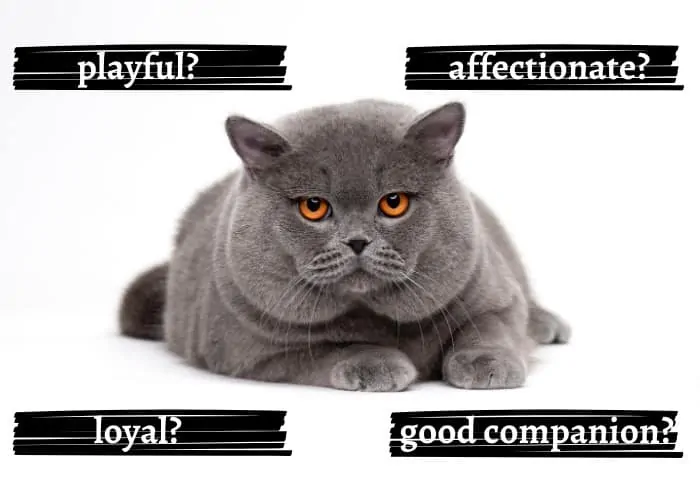
The overall temperament of the breed is playful, friendly, and affectionate.
British Shorthairs are generally good-natured toward children and other pets- even dogs. They are infrequent talkers, so you’d better be listening if it’s talking to you.
Their easy-going nature, crossed with a high tolerance to activity around them, makes them a good choice for an active or growing family.
They are well known for forming strong bonds with their owners and showing loyalty wherever they can. They are also strong purring cats, which helps us know what kind of mood it’s in.
Despite their friendly and placid temperament, they like to have their own boundaries of independence. But when they want to play, they’ll often let you know or will play by themselves.
They will inform you when they want your attention by making their presence known.
Are British Shorthairs Affectionate?
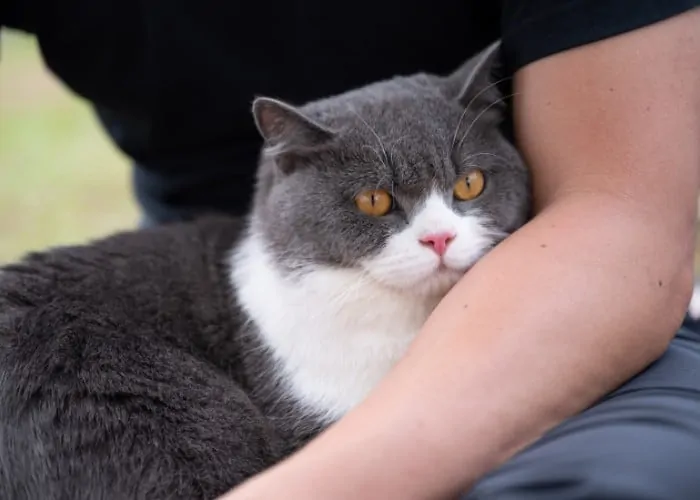
British Shorthairs are incredibly loving and affectionate to their owners or family despite their disdain for being picked up.
They are not standoffish with familiar faces and often seek attention that they understand as affectionate.
It isn’t uncommon for them to brush up against your feet or legs and follow you around the house.
Also, they’ll enjoy your company in any way they can, curling beside you while you’re using the computer or watching TV.
They are in no way an aloof or distant breed. They are affectionate, but in their way and on their terms. Remember that we’re talking about the breed as a whole, and there are always exceptions.
Some British Shorthair cats may love to be picked up and handled. Some might even jump in your lap and never want to get down.
These are exceptions to the rule, though, and overall, it’s unlikely that you’ll wind up with one that enjoys that kind of attention. Be observant if you want to do right by the affection department cat.
Are British Shorthairs Lap Cats?
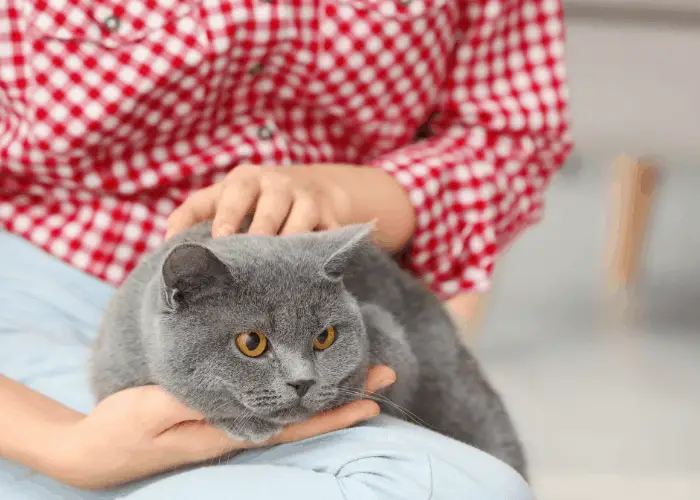
Are British Shorthairs lap cats?
No, not really.
They do enjoy being close to you but are not necessarily willing to claim real estate on your lap.
They may choose to lay down beside you or anywhere near you, but it would be a rare privilege for one to choose to lay down on your lap. British Shorthairs may choose to lay down or hang out within arm’s reach because they enjoy your company.
Some may be content with just being in the same room, not wanting to miss anything. Others might like to make sure that you’re always within eyeshot. The British Shorthair is notoriously a low-maintenance cat, physically and also behaviorally.
But unfortunately, for those who would rather behave as a lap cat, this isn’t one of their common traits.
Though they were bred with Persians in the mid-1900s to help repopulate the breed (who tend to be lap cats), this particular form of affection did not cut genetically.
Are British Shorthair Cats Cuddly?
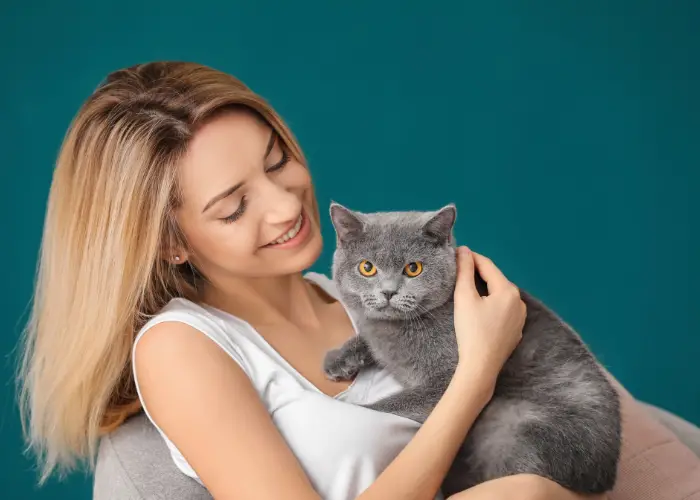
British Shorthair cats are not particularly cuddly. In this regard, I saw it best said that they are extraordinary companions rather than squishy cuddlers, despite how cuddly they appear.
Some individuals within the breed may succumb to cuddles depending on their tolerance, but as a rule, they’re not big fans of this type of attention. With British Shorthair cats, any attention that falls outside their control is unwanted.
Grabbing onto your Shorthair and giving it a dose of cuddles fall within the “unwanted attention” category, alongside being held.
Don’t Force Yourself Upon your British Shorthair
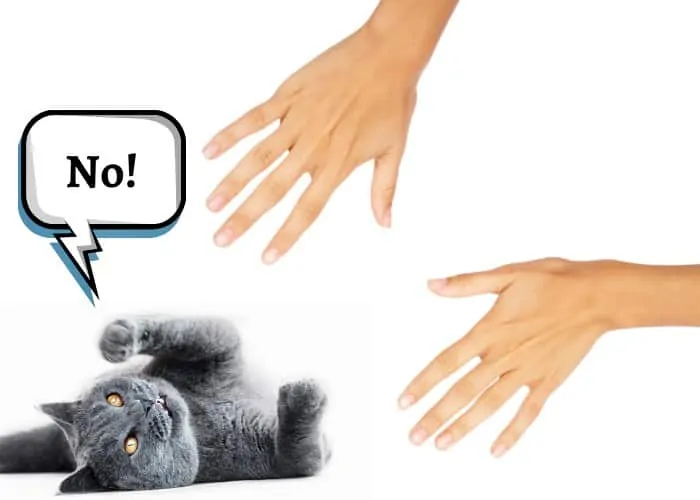
Trying to force issues that are offensive to the cat, such as being held or forced cuddling, can slowly drive a wedge of distrust between you and your cat. Nobody wants that to happen, neither you nor the cat.
When you repeatedly force the cat to be held when it doesn’t want to be held, you’re not conditioning the cat to like the situation. They don’t see the point that you’re trying to make.
They see the conditions that cause it to happen and learn to avoid them.
In this case, if they think that sitting next to you will be picked up, eventually, they’ll stop doing it. If rubbing against your leg keeps being picked up, eventually, they’ll be more hesitant to do so.
You know that you are only seeking to give it more attention, but as far as the cat is concerned, it’s being punished for good and affectionate behavior.
Final Thoughts
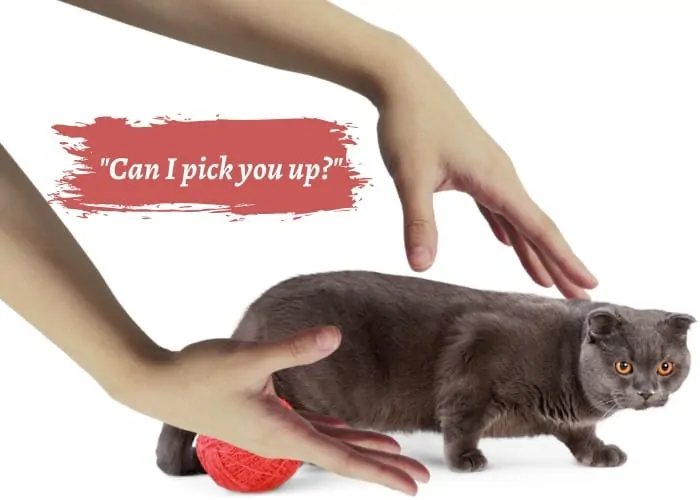
Every cat breed has its perks, and there is no exception with the British Shorthair. They differ from others in showing their love and affection to their families.
Differing in that they have different ways of showing their affection than other breeds.
That’s all.
When you respect how they show and accept affection, you’ll form a bond with the cat that will last its whole life.
Worth A Look: Philippine’s Domestic Short Cat( PUSPIN )Article
Related Questions:
Can British Shorthair Cats Go Outside?
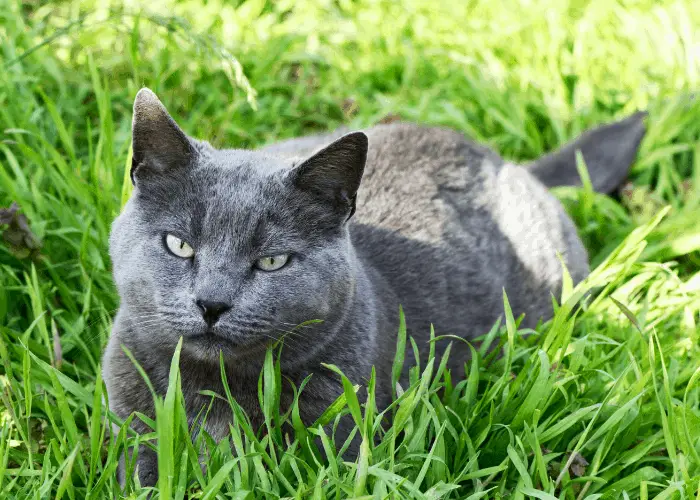
British Shorthairs can go outside, and in a safe and controlled area, they’d get around just fine and enjoy themselves.
The real question is,
“Should they go outside?”
The answer to that question heavily relies on where you live and what else you are living in the area. Most cats adapt well to outdoor living many insist upon it.
But a large breed that isn’t the best jumpers and climbers might have a difficult time if a need arises.
Dogs can be an issue in neighborhoods, and traffic would be a concern. Also, as is true with any purebred, there’s always a danger of it being taken in by someone who recognizes the cat’s value.
In other words, catnapped. In this case, their human-friendly nature can make catnapping all that much easier. Sure, you would probably have your cat chipped, but would you be willing to put it to the test?
Out in rural areas, different concerns come into play. Although cats are notorious predators, that is only a problem for animals of equal size or smaller than they are (generally).
As far as British Shorthairs are concerned, they would be easy prey for larger predators in the woods- particularly in the United States.
Coyotes, wild dogs, wild pigs, other large wild cats, and even bears, in certain circumstances, can all be threats to a British Shorthair more so than other breeds or mixed breeds.
Predator-like grace, lightning speed, high jumping, and the ability to quickly scale trees and back down again were not bred into the Shorthair’s toolbox.
So, to answer the questions above, the British Shorthair Cat can go outside and enjoy itself and be just fine.
Should the cat be out there in the first place?
Depending on where you live, probably not.
Fortunately, British Shorthairs are often perfectly content to stay indoors and are independent enough to keep themselves occupied.
Do British Shorthair Cats Need a Companion?
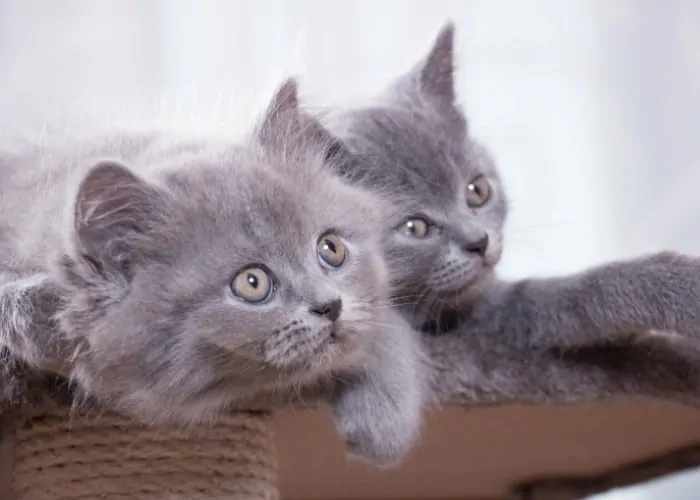
British Shorthairs don’t need to have a companion. They are independent in that they enjoy having their own space and can be perfectly content by themselves in that space.
That’s not to say that they’d have a hard time getting along with another cat or dog. It’s typical for the breed to have no problem being friendly to either one– they don’t need the company to be happy.
Cats out there do much better having a companion to share their living space with. Some cats seem lonely and appreciate having another cat to play with.
But that isn’t something that umbrellas to every breed, the least of which is the British Shorthair.
After having said all that, giving your British Shorthair a companion isn’t a bad thing or a bad idea.
Why not give your cat a partner in crime to hang around with when you’re not around?
Due to the danger of becoming overweight, giving your cat a friend might be a healthy idea. Another cat can stimulate some playful behavior, assisting in giving them some exercise that wouldn’t have happened otherwise.
As long as they are properly introduced, they’d get along without problems.
